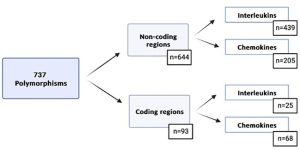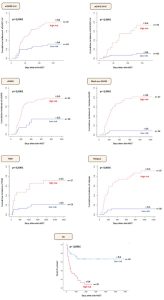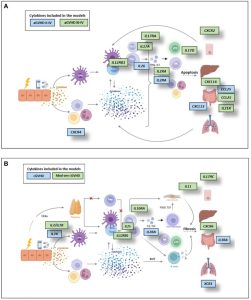Identification of predictive models including polymorphisms in cytokines genes and clinical variables associated with post-transplant complications after identical HLA-allogeneic stem cell transplantation
- PMID: 39247183
- PMCID: PMC11377344
- DOI: 10.3389/fimmu.2024.1396284
Abstract
Backgrounds: Although allogeneic hematopoietic stem cell transplantation (allo-HSCT) is a potentially curative therapy for hematological malignancies, it can be associated with relevant post-transplant complications. Several reports have shown that polymorphisms in immune system genes are correlated with the development of post-transplant complications. Within this context, this work focuses on identifying novel polymorphisms in cytokine genes and developing predictive models to anticipate the risk of developing graft-versus-host disease (GVHD), transplantation-related mortality (TRM), relapse and overall survival (OS).
Methods: Our group developed a 132-cytokine gene panel which was tested in 90 patients who underwent an HLA-identical sibling-donor allo-HSCT. Bayesian logistic regression (BLR) models were used to select the most relevant variables. Based on the cut-off points selected for each model, patients were classified as being at high or low-risk for each of the post-transplant complications (aGVHD II-IV, aGVHD III-IV, cGVHD, mod-sev cGVHD, TRM, relapse and OS).
Results: A total of 737 polymorphisms were selected from the custom panel genes. Of these, 41 polymorphisms were included in the predictive models in 30 cytokine genes were selected (17 interleukins and 13 chemokines). Of these polymorphisms, 5 (12.2%) were located in coding regions, and 36 (87.8%) in non-coding regions. All models had a statistical significance of p<0.0001.
Conclusion: Overall, genomic polymorphisms in cytokine genes make it possible to anticipate the development all complications studied following allo-HSCT and, consequently, to optimize the clinical management of patients.
Keywords: allogeneic transplantation; cytokines; graft-versus-host-disease; polymorphisms; predictive models.
Copyright © 2024 Muñiz, Martínez-García, Bailén, Chicano, Oarbeascoa, Triviño, de la Iglesia-San Sebastian, Fernández de Córdoba, Anguita, Kwon, Díez-Martín, Olmos, Martínez-Laperche and Buño.
Conflict of interest statement
The authors declare that the research was conducted in the absence of any commercial or financial relationships that could be construed as a potential conflict of interest.
Similar articles
-
Blood Adv. 2018 Jul 24;2(14):1719-1737. doi: 10.1182/bloodadvances.2017011502.PMID: 30030270Free PMC article.Clinical Trial.
-
Ann Hematol. 2021 Mar;100(3):763-777. doi: 10.1007/s00277-021-04428-9. Epub 2021 Jan 25.PMID: 33491135Free PMC article.
-
Zhonghua Nei Ke Za Zhi. 2014 Jan;53(1):35-9.PMID: 24674726Chinese.
-
PLoS One. 2016 Jun 24;11(6):e0158242. doi: 10.1371/journal.pone.0158242. eCollection 2016.PMID: 27341514Free PMC article.
-
Dan Med Bull. 2007 May;54(2):112-39.PMID: 17521527Review.
Cited by
-
Relationship Between an Interleukin 6 SNP and Relapse After Allogeneic Bone Marrow Transplantation.
J Clin Med. 2025 Jan 13;14(2):476. doi: 10.3390/jcm14020476.PMID: 39860482Free PMC article.
References
- Copelan EA. Hematopoietic stem-cell transplantation. N Engl J Med. (2006) 354:1813–26. doi: 10.1056/NEJMra052638 – DOI – PubMed
- Ferrara JL, Levine JE, Reddy P, Holler E. Graft-versus-host disease. Lancet. (2009) 373:1550–61. doi: 10.1016/S0140-6736(09)60237-3 – DOI – PMC – PubMed
- Horwitz ME, Sullivan KM. Chronic graft-versus-host disease. Blood Rev. (2006) 20:15–27. doi: 10.1016/j.blre.2005.01.007 – DOI – PubMed
- Henden AS, Hill GR. Cytokines in graft-versus-host disease. J Immunol. (2015) 194:4604–12. doi: 10.4049/jimmunol.1500117 – DOI – PubMed
- Dickinson AM, Charron D. Non-HLA immunogenetics in hematopoietic stem cell transplantation. Curr Opin Immunol. (2005) 17:517–25. doi: 10.1016/j.coi.2005.07.017 – DOI –PubMed



